What Is the Symbolic Meaning of a Knife? Traditions!
The symbolic meaning of a knife encompasses a range of interpretations, often representing duality as it can signify both protection and aggression. In various cultures, knives are symbols of division and sacrifice, as well as tools of craft and daily living.
The knife is an emblem with deep roots in human history, playing a role in rituals, traditions, and everyday life.
Its symbolism can be broken down as follows:
- Protection and Aggression: The knife’s sharpness and ability to cut make it a symbol of protection, yet the same features can also imply aggression or conflict.
- Division and Separation: A knife can symbolize the act of cutting ties or making distinctions between choices.
- Sacrifice and Suffering: In religious and cultural contexts, knives are often associated with sacrifice, whether literal or metaphorical.
- Craftsmanship and Utility: As a tool, the knife represents skill and the ability to shape materials or provide sustenance.
- Metaphysical and Spiritual: In a spiritual sense, knives can represent the severing of material bonds or the precision of intellectual discernment.
For example, in Tarot cards, the suit of swords, which often includes imagery of knives, is associated with intellect, action, and conflict.
Exploring the knife’s symbolism reveals its dual nature as both a creative force and a harbinger of division.
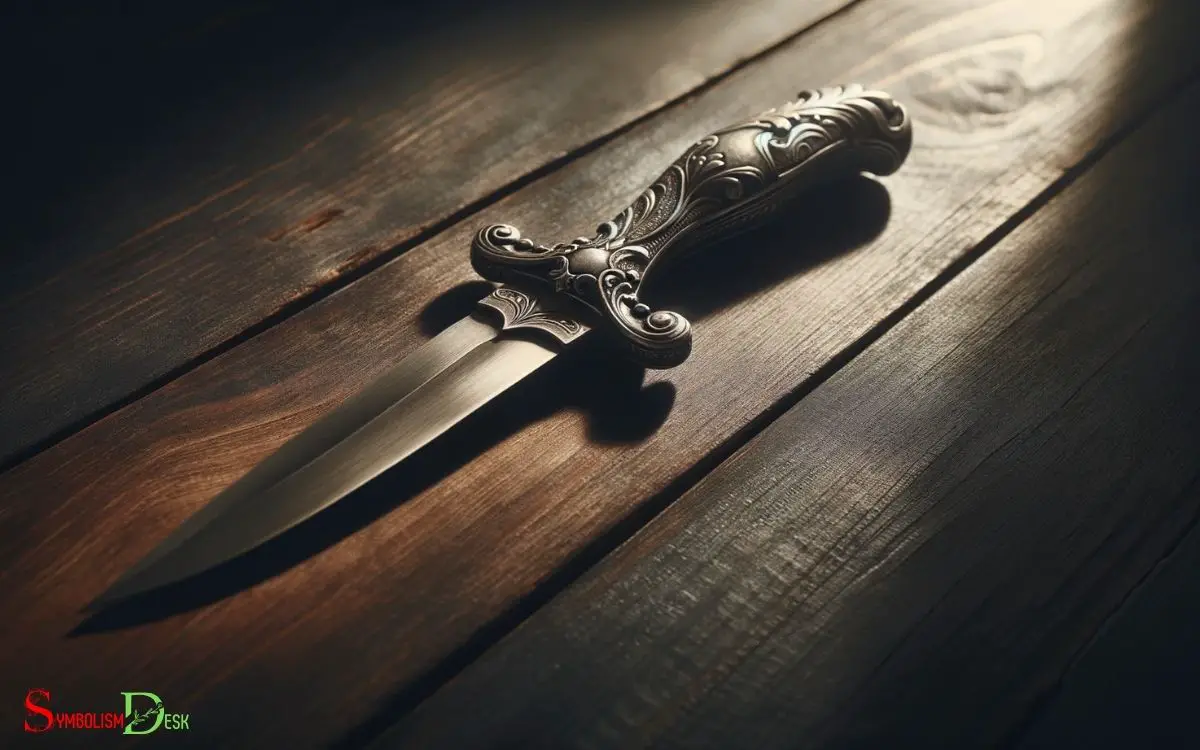
Key Takeaway
Historical Significance of Knives
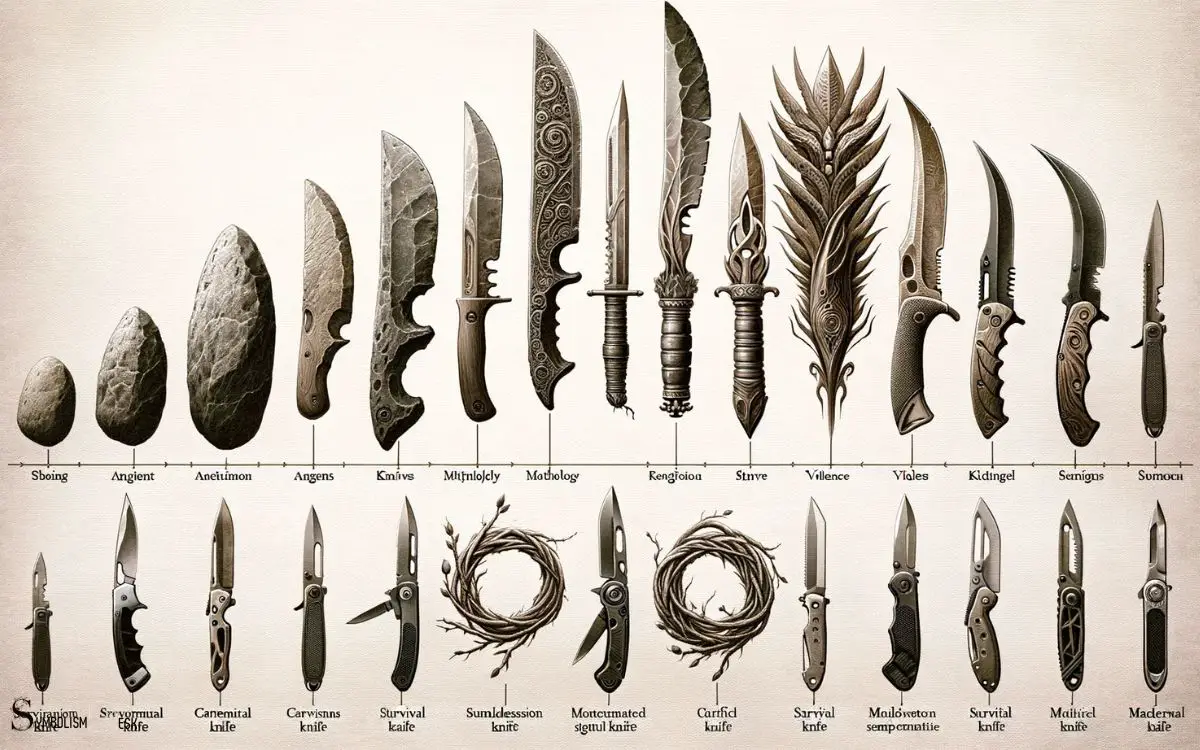
Having been used for centuries, knives have played a significant role in shaping the historical development of various cultures and societies.
The earliest knives were made of stone, and their purpose extended beyond hunting and gathering to include activities such as crafting, cooking, and protection.
As societies evolved, so did the knives, with metal replacing stone as the primary material. Knives became essential tools for survival and progress, contributing to the advancement of agriculture, trade, and the development of civilizations.
They also held symbolic and ceremonial significance in many cultures, representing power, prestige, and tradition.
The historical significance of knives is evident in their depiction in ancient artwork, religious rituals, and folklore, highlighting their enduring presence and influence in human history.
Cultural Interpretations of Knives
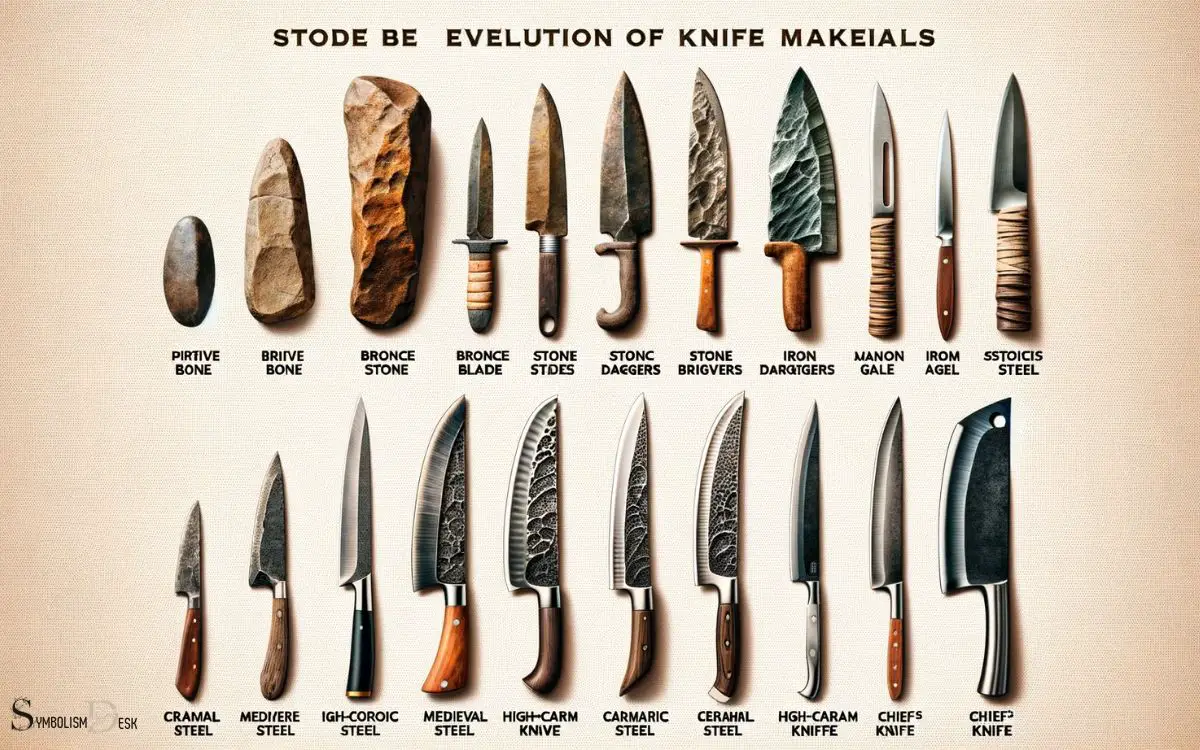
Different cultures have diverse interpretations of the symbolism of knives, with some viewing them as tools of protection and others associating them with danger and aggression.
Knives are often integral to various rituals and ceremonies, playing significant roles in cultural traditions and customs.
Understanding the historical significance of knives in different cultures sheds light on the symbolic meaning attributed to them.
Symbolism in Different Cultures
In various cultures around the world, knives hold symbolic significance for their roles in rituals and traditions.
- Japanese Culture: In Japan, the kirpan, a ceremonial knife, symbolizes the samurai’s honor and is often passed down through generations.
- Native American Culture: Among Native American tribes, the ceremonial knife represents courage, strength, and protection. It’s used in rituals and as a symbol of respect.
- Scandinavian Culture: The seax, a type of knife, holds symbolic significance in Scandinavian culture, representing independence and self-reliance.
- African Culture: In various African cultures, knives are used in coming-of-age ceremonies and symbolize a rite of passage into adulthood, signifying responsibility and maturity.
These cultural interpretations of knives highlight the diverse symbolic meanings attached to this tool across different societies.
Ritual and Ceremonies
Knives are significant in many cultural rituals and ceremonies around the world. For example, in some African cultures, knives are used in coming-of-age ceremonies to symbolize the transition from boyhood to manhood.
In some Native American traditions, knives are used in ceremonial dances to represent bravery and honor.
In Japanese culture, the ritualistic act of presenting a knife symbolizes respect and trust. In Sikhism, the kirpan, a ceremonial dagger, represents the duty to stand up against injustice.
These examples illustrate the diverse symbolic meanings of knives in cultural rituals and ceremonies, where they often signify important values, transitions, and responsibilities within the community.
Historical Significance
Knives have held cultural interpretations and historical significance across various societies, shaping traditions and values.
- Ancient Rituals: In many ancient cultures, knives were used in rituals and sacrifices, symbolizing power and the ability to take life.
- Status and Prestige: Throughout history, owning an ornate or finely crafted knife was a symbol of wealth and social standing.
- Warfare and Protection: Knives have been essential tools for survival and warfare, representing strength, protection, and the ability to provide for one’s family.
- Spiritual Significance: In some cultures, knives were believed to possess spiritual energy and were used in religious ceremonies to ward off evil spirits or to signify a sacred bond.
Understanding the historical significance and cultural interpretations of knives provides insight into the values and beliefs of different societies throughout history.
Symbolism in Mythology and Folklore
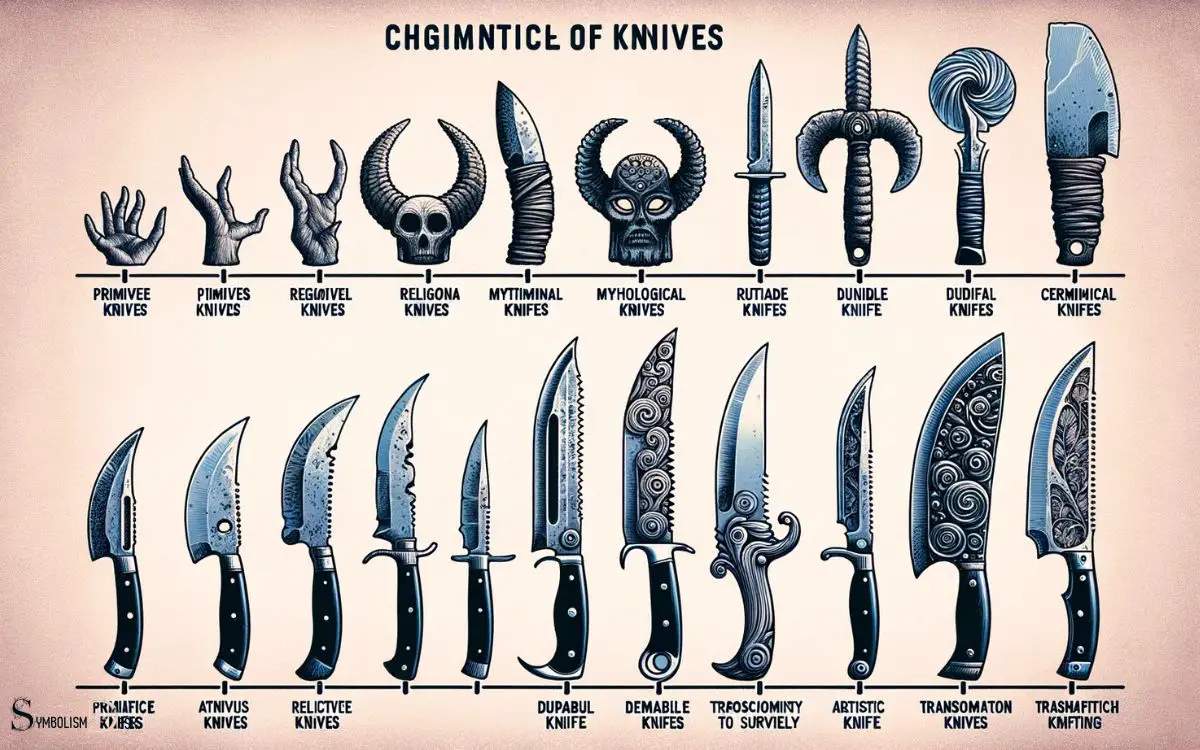
Mythology and folklore have long used the knife as a symbol, reflecting various cultural beliefs and practices. In many myths, the knife is depicted as a tool of protection, serving as a guardian against evil forces.
Additionally, the knife often holds significance as a sacrificial instrument, representing the offering of life or resources for a greater purpose.
Knife as Protection Symbol
In various cultures and traditions, the knife serves as a symbol of protection, embodying the idea of safeguarding against harm and evil forces. This symbolism is prevalent in mythology and folklore, where the knife is often depicted as a tool for defense and warding off malevolent spirits.
- In Greek mythology, the double-edged sword known as Harpe was wielded by Perseus to slay Medusa, emphasizing the protective nature of the weapon.
- In Norse mythology, the god Thor is often depicted wielding a magical and powerful knife, emphasizing its protective qualities against the forces of chaos and destruction.
- In Japanese folklore, the Tantō, a traditional Japanese knife, is associated with protection and honor, often carried by samurai as a symbol of their duty to protect their lord and maintain order.
- In Native American traditions, the ceremonial use of the knife symbolizes protection and is believed to have spiritual significance in safeguarding against negative energies.
Knife as Sacrifice Symbol
The symbolic representation of a knife as a sacrificial tool is deeply rooted in diverse mythologies and folklore, signifying offerings and rituals across various cultures.
In many ancient cultures, the act of sacrifice was considered a way to appease gods or higher powers, and knives were often used in these ceremonies.
For example, in Greek mythology, the god Cronus castrated his father Uranus with a sickle, symbolizing the separation from the old order and the birth of new life.
Additionally, in Norse mythology, the god Odin sacrificed himself by plunging a spear or knife into his own side in pursuit of knowledge and wisdom.
These stories illustrate how the knife is intertwined with the concept of sacrifice, representing a profound and symbolic act of offering in various mythologies and folklore.
Knife as Tool Symbol
Symbolically, knives frequently serve as essential tools in various mythologies and folklore, embodying multifaceted symbolism and cultural significance.
In mythology and folklore, the knife as a tool symbol represents:
- Protection: In various cultures, knives are seen as tools for protection, warding off evil spirits and negative energies.
- Creation: Knives are often associated with the act of creation, as they’re used for carving and shaping objects.
- Harvest: In agricultural societies, knives are vital for harvesting crops and fruits, symbolizing abundance and sustenance.
- Transformation: Knives are used for cutting and shaping materials, representing the transformative process in various creation myths.
These symbolic meanings highlight the profound role of knives as tools in shaping cultural narratives and belief systems.
Understanding these symbols provides insight into the significance of knives in mythology and folklore, paving the way for exploring their representation in literature and art.
Knives in Literature and Art
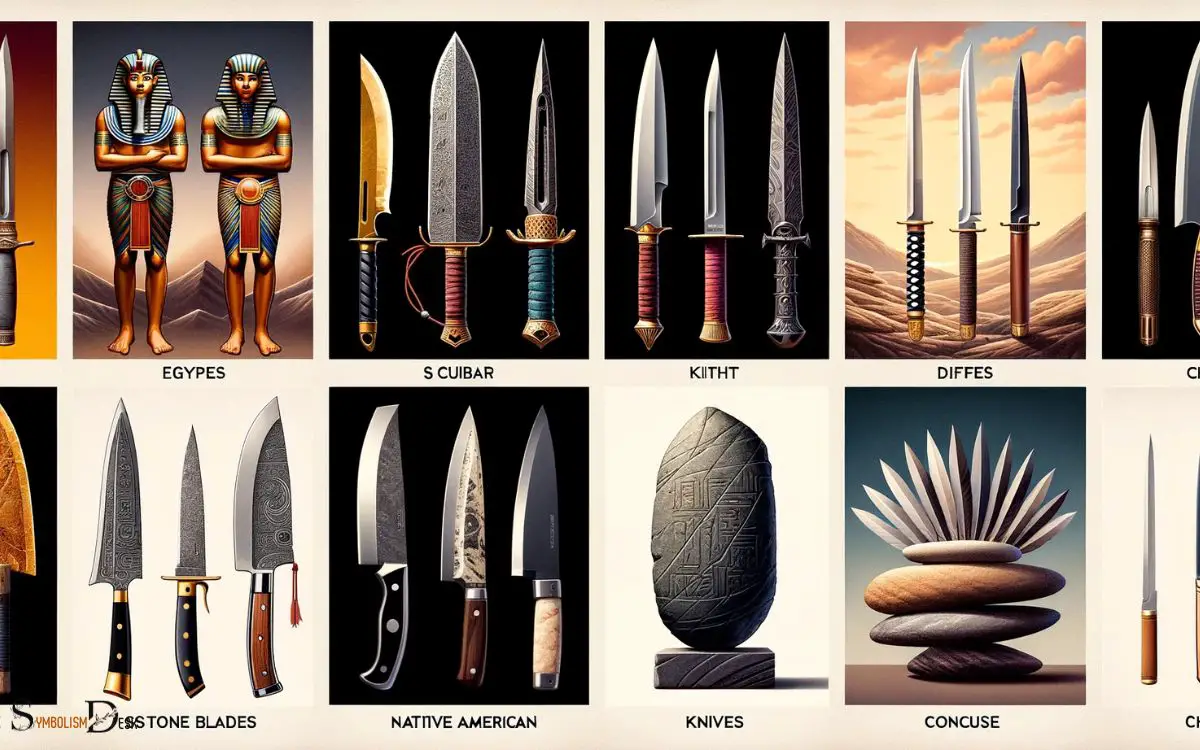
Knives have been prominently featured in literature and art throughout history, often symbolizing themes of power, violence, and transformation. In literature, the knife is a versatile symbol that can represent both creation and destruction.
For example, in Shakespeare’s ‘Julius Caesar,’ the knife is used as a tool of political power and betrayal.
In art, the knife has been depicted in various forms, from still life paintings to modern sculptures, each carrying its own symbolic meaning. Artists often use knives to convey themes of conflict, struggle, and the human experience.
The use of knives in literature and art reflects the complex and multifaceted nature of the symbol, providing a rich source of inspiration and contemplation for audiences seeking to understand its deeper meaning.
Psychological and Spiritual Meanings
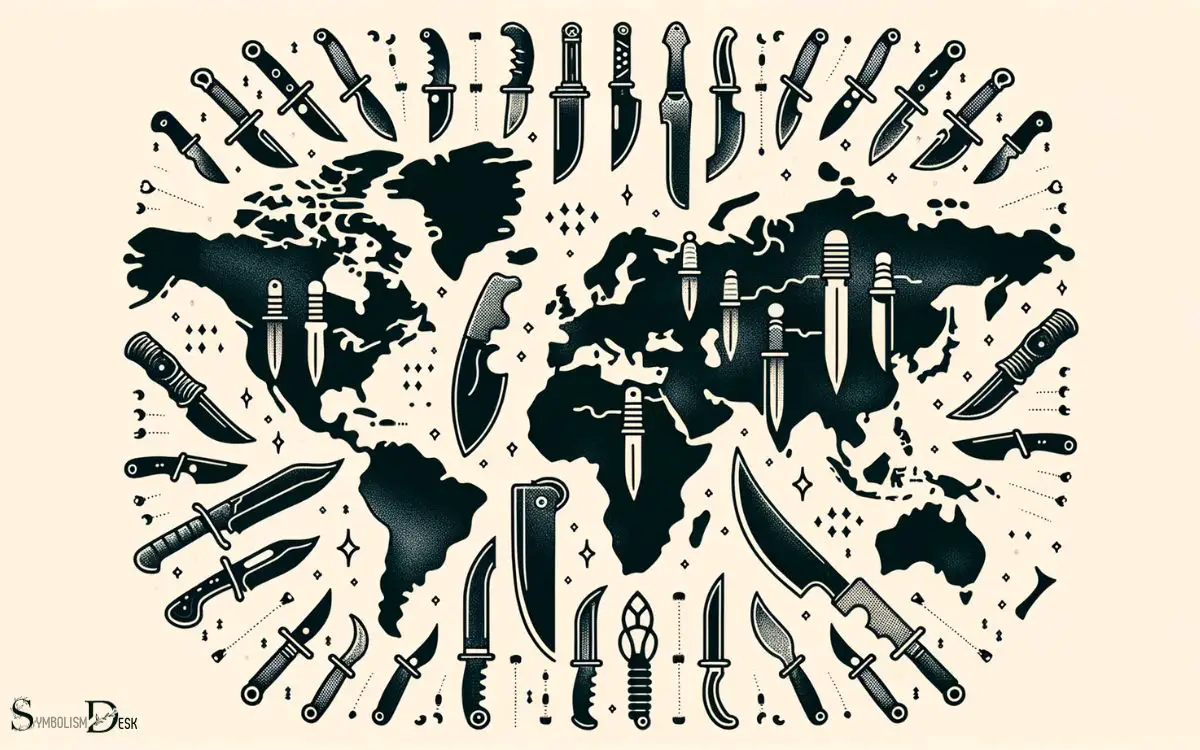
In the realm of psychological and spiritual symbolism, knives often serve as conduits for conveying themes of inner conflict and transformation.
- Inner Conflict: Knives can symbolize the inner turmoil and struggles within an individual, representing the battle between different emotions, desires, or thoughts.
- Transformation: The act of using a knife for cutting or carving implies a transformation process. This can be seen as a metaphor for personal growth, the shedding of old ways, and the emergence of something new.
- Power and Control: Knives are often associated with power and control, reflecting the ability to cut through obstacles or to protect oneself.
- Release and Healing: In some spiritual contexts, knives symbolize the cutting away of negative energies or the release of emotional burdens, leading to healing and renewal.
Are Knives Also Symbolic of Aggression in Some Traditions?
In some traditions, the symbolic meaning of sword aggression is associated with knives as well. The sharpness and piercing nature of knives can represent aggression or conflict. For example, in certain martial arts, the use of knives is symbolic of aggression and defense techniques.
Contemporary Symbolism of Knives
The contemporary symbolism of knives continues to reflect their role as conduits for conveying themes of inner conflict and transformation, as well as their association with power and control.
In modern times, knives are often used as symbols in literature, art, and media to represent the duality of human nature, where they can embody both destructive and constructive forces.
This duality is seen in the portrayal of knives as tools for both harm and healing, reflecting the complexities of human emotions and experiences.
Additionally, knives are frequently employed as symbols of power and control, signifying the ability to influence or manipulate a situation or individual.
The contemporary symbolism of knives thus captures the ongoing relevance of these objects in representing the intricate and multifaceted aspects of human existence.
Conclusion
The symbolic meaning of a knife is both complex and varied, spanning across history, culture, and psychology. From ancient times to the present day, the knife has been used as a tool for survival, a weapon for protection, and a means of sacrifice. In some cultures, the act of giving or receiving a knife is seen as a symbol of trust and loyalty. Exploring symbolic tapestry art, we can see how the image of a knife can represent power, conflict, or even transformation. The knife also holds psychological significance, often being associated with themes of danger, fear, and aggression. Overall, the symbolic meaning of a knife is deeply intertwined with the human experience and can evoke a wide range of emotions and interpretations.
It has been seen as a tool of survival and protection, as well as a symbol of danger and harm.
From ancient myths to contemporary art, the knife holds a powerful and often contradictory significance that continues to intrigue and captivate people across the world.
ht, strength and fragility, and the constant search for balance in our lives.






